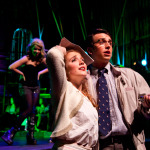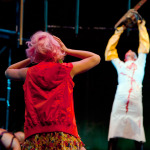The latest production from the Yale Dramatic Association will tackle the challenges of experimental theater by interacting with its audience.
The Dramat’s Fall Mainstage production, “The Rocky Horror Show” by Richard O’Brien, opens tonight at the University Theatre. The musical follows a couple that stumbles upon the home of a transvestite doctor, who challenges their sense of normalcy through a series of bizarre displays, including the killing of a brain-damaged biker. The production is directed by New York City-based director Travis Greisler and produced by Henry Tisch ’16. Greisler said the ensemble aimed to portray the chaotic nature of the show by staging an experimental performance that invites a large amount of audience participation.
“Our take on the show was to, instead of fighting against it, embrace it,” Greisler said.
The interactive aspect of the show begins before the first word of the script is spoken. Greisler encourages audience members to arrive early, as even before the play begins, spectators will be participants in tasks such as tying up the characters’ shoes or conducting a Ouija board ceremony.
During the first few years after the play’s premiere in 1973, audiences began to participate in performances by shouting remarks during moments of silence in the play. Tim Creavin ’15, who plays Dr. Frank N. Furter, said that throughout the show, members of the cast that play “phantoms” act as a type of audience by repeating such callbacks. The phantoms also take part in selecting members of the audience to participate in the show, he added.
Greisler added that 14 members of the audience will be able to sit in seats that are located on stage. At the same time, he noted, the phantom characters will engage with audiences and invite them to tell parts of the story or to act as a prop or character on stage. Tisch added that the production uses the traditional setting of the University Theatre as a playground for a more experimental type of theater.
Five cast and creative team members interviewed highlighted the challenge of putting on a show whose cult following includes many potential audience members. Greisler explained that the production includes elements present in past productions of the play and film as well as a number of modern references and aesthetics. The modern interpretation of the show is based in part on the late 20th-century “Club Kids”–a group of young individuals in New York City who were known for their outlandish fashion as well as their heavy drug use, Greisler said.
Creavin explained that the character he plays is heavily inspired by Michael Alig, who was a leader of the Club Kids and imprisoned for the manslaughter of a drug dealer. Creavin explained that the production plays an homage to this club culture.
Christian Probst ’16 and Sarah Chapin ’17, who play Brad and Janet in the show, said that they think the production is especially relevant for Yale culture because of the way it features themes of being pushed out of one’s comfort zone into new environments, noting that many students came to Yale from places that are drastically different from New England. They add that the play also addresses the concept of diversity in gender and sexuality.
Probst noted that the interactive aspect of the show would easily make it “a Yale Rocky Horror Show.”
Tisch explained that Rocky Horror does not resemble most Dramat shows because it is not considered a traditional part of musical theater canon. He added that the Dramat felt it was time to do something different, adding that the show’s themes are immediately relevant to Yale students.
Greisler said that the costumes used in the production reflect its modern interpretation, noting that many of the costumes resemble outfits worn by pop music artists such as Lady Gaga, Madonna and Pink. Creavin said his character changes clothes roughly seven times in the show, noting that form-fitting outfits, including ones that prominently feature sequins and glitter, highlight the ambiguity of his character’s gender.
Tisch added that the production is consistent with the contemporary movement of immersive theater, exemplified in shows such “Sleep No More” and “Here Lies Love,” which emphasize audience participation. Greisler explained that such productions focus more on creating an engaging performance rather than a highly detailed plot.
Performances of “The Rocky Horror Show” will run through Saturday night.









